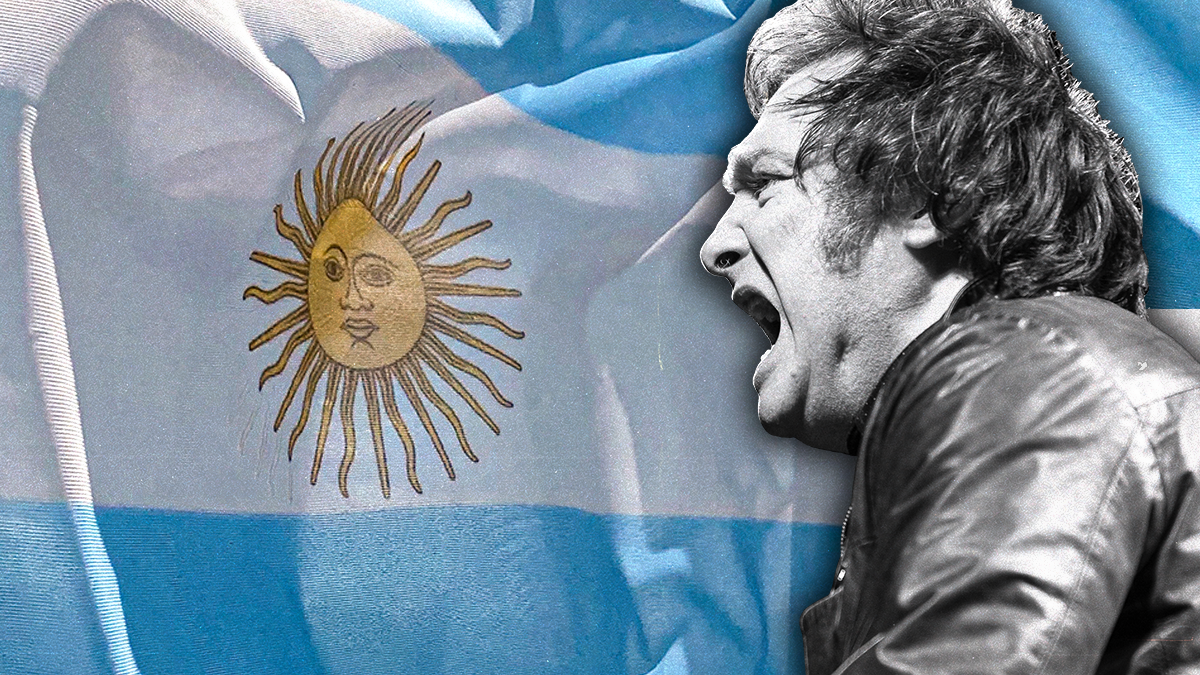For the first time ever, someone unaffiliated with either of Argentina’s two main political blocs is making a serious run at the presidency. In fact, Javier Milei is not a traditional politician but an eccentric economist and TV provocateur who promises radical measures to rescue an economy in shambles and tame an annual inflation rate hovering over 100%. He claims to not have brushed his hair since he was 13 and is famous for antics like auctioning off his paycheck. With six months to go to the Oct. 22 election, Milei's message is resonating especially with young voters fed up with a political establishment that has long been unable to solve the country’s problems. Let's learn more about this guy from Eurasia Group analyst Luciano Sigalov.
Who is Javier Milei?
A former university professor and corporate economist, the 52-year-old Milei first captured the public’s attention as a conservative pundit on television talk shows. His unruly hair, wild eyes, and inflammatory statements – for example, calling politicians “thieves” and “criminals” – made him a charismatic figure. In 2021, Milei won a seat in congress. Now, he is running for president as the head of his Liberty Advances party.
What are Milei’s political views?
His views have a lot in common with those of far-right populists such as Donald Trump and Brazil’s Jair Bolsonaro. Milei believes politics is a no-holds-barred contest between the “good guys” and the “bad guys,” the latter represented by traditional political parties from the left to the center right of the political spectrum, which he calls the “caste.” He opposes feminism and abortion as part of a crusade against “cultural Marxism” that he believes has awarded minority groups with too many rights, to the detriment of what he considers ordinary people. And he promises a return to an early-20th-century golden era when Argentina was one of the richest countries in the world thanks to its booming agricultural and beef exports.
Milei calls himself an “anarcho-capitalist” – what does that mean?
Anarcho-capitalists seek the dismantling of the state and the creation of a society regulated solely by the free interactions of individuals and their property. But given the impossibility of implementing this vision in the real world, Milei wants to reduce the state’s presence to a bare minimum. He has proposed eliminating several ministries, privatizing state-owned companies, dollarizing the economy, and shuttering the central bank.
Why is Milei so popular?
He is a gifted demagogue who has effectively tapped into a rising tide of antiestablishment sentiment. Opinion surveys show that his popularity is driven more by his vehement criticism of the political elite than by his radical policy proposals and references to economic theories most people have never heard of. Yet the simplicity of the solutions he offers to intractable problems also has appeal for many voters – especially his proposal to replace the country’s currency with the dollar as a remedy for runaway inflation.
What are his main strengths and weaknesses as a candidate?
Novelty is his biggest strength. He has not previously been in government, so he can freely criticize the two main political coalitions, blaming them for all the country’s problems. Yet his rhetoric is too radical to win over many voters, and he lacks an organization capable of conducting an effective national campaign. Nor does he have a team ready to assume office if he wins.
What do the polls say about his chances?
Polls in Argentina do not have a good track record, so they need to be taken with a pinch of salt. The latest polling is tied to the Aug. 13 primaries (everyone running for president in Argentina is required to participate in the primaries, even if they are their parties’ only candidates, as in Milei’s case). Recent surveys show that about 20% of respondents say they would vote for Milei in the primaries, second only to the share supporting Vice President Cristina Fernández de Kirchner (25%), who is not running. That said, the two potential candidates for the Together for Change opposition have a combined vote share of about 30%. The ruling Everybody’s Front has about 25%. President Alberto Fernández — no relation to his Veep — is not running for reelection.
The polling suggests that Milei has a good chance of a second-place finish in the Oct. 22 election, which could force a runoff between the top two finishers on Nov. 19. A runoff is required if the election’s winner fails to obtain at least 45% of the vote or 40% of the vote and at least a 10 percentage point lead over the second-place finisher.
What does Milei’s fame tell us about the state of Argentinian politics and the country today?
It reflects the failure of the political class to agree on basic policies to get the country moving again and end an economic crisis that has gone on for far too long. It also shows that, even though memories of the country’s 1976-83 military dictatorship remain fresh, Argentines are not immune to the appeal of far-right populism and politicians of dubious democratic credentials.
Is Milei an authoritarian?
He has made numerous comments that suggest he might not respect the rules of democracy were he to win the election. He has enthusiastically praised leaders such as Trump and Bolsonaro, who sought to undermine the rule of law in their countries, and has said he would resort to popular consultation mechanisms if congress were to reject his reform plans. When talking about Argentina’s golden era, he links its end to the election of Hipólito Yrigoyen as president in the country’s first free and fair vote in 1916. And though Milei condemns the recent military dictatorship, he disputes the official number of 30,000 people killed or kidnapped by the regime.
Edited by Jonathan House, Senior Editor, Eurasia Group.
